28 Jan Sow’s constipation is directly related to production of colostrum and milk
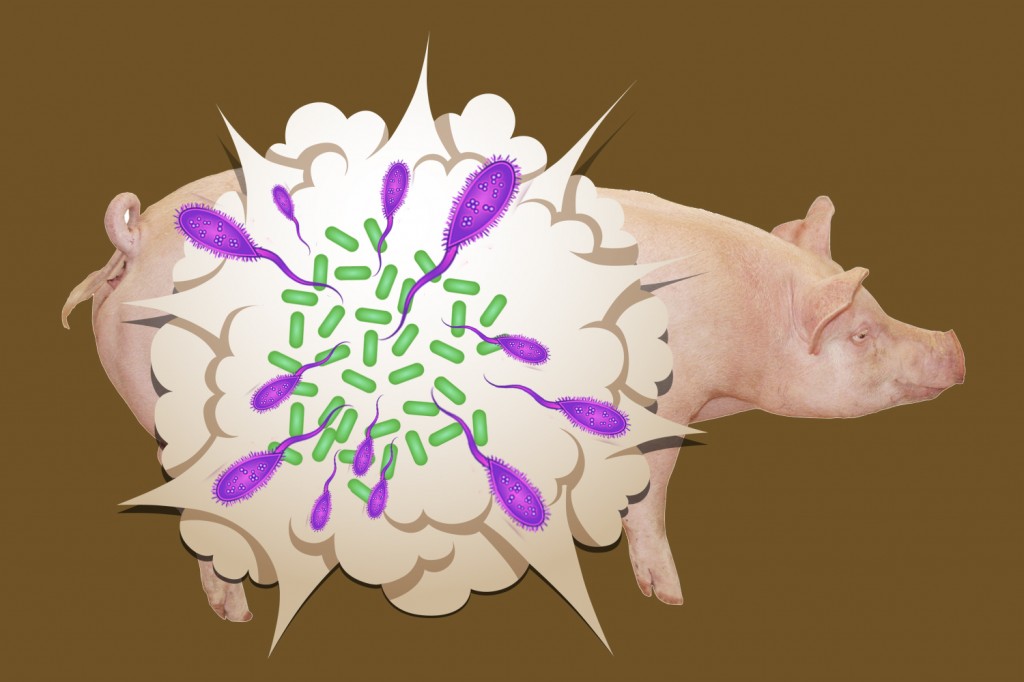
Constipation is a very common problem in late pregnant and lactating sows kept under close confinement, mainly due to insufficient fiber in feed or to lack of exercise. Heavier sows, from second parity onwards, are more affected than lighter sows.
Whenever the sow does not defecate properly for 5 days (producing hard feces or not feces at all), constipation may become a serious condition.
If the sow is affected by constipation:
- Feed intake is reduced and, as a consequence, less nutrients are available for colostrum and milk production. Decreased feed intake of the sow impacts the weight of the piglet at weaning, back fat thickness at the end of lactation and also the weaning to service interval.
- The sow is nervous and stressed, lies on its belly or sits like a dog, and it is reluctant to stand up.
- The process of farrowing might be slower than normal, putting the survival of the piglets at risk.
- Gut flora suffers a profound imbalance that leads to changes in the hormonal metabolism.
Changes in gut flora due to constipation
Constipated animals suffer a reduction of intestinal peristaltic movements that changes the environmental conditions in the gut. This leads to an abnormally fast proliferation of Gram-negatives such as E.coli that, when conditions change after the phase of exponential growth, lose viability and massively die.
When they die, portions of the Gram negative cell walls become powerful endotoxins called lipopolysaccharides (LPS). LPS are absorbed through the gut wall into blood and cause enterotoxemia. The physiological activities of LPS are mediated mainly by their fat-soluble part, called lipid A.
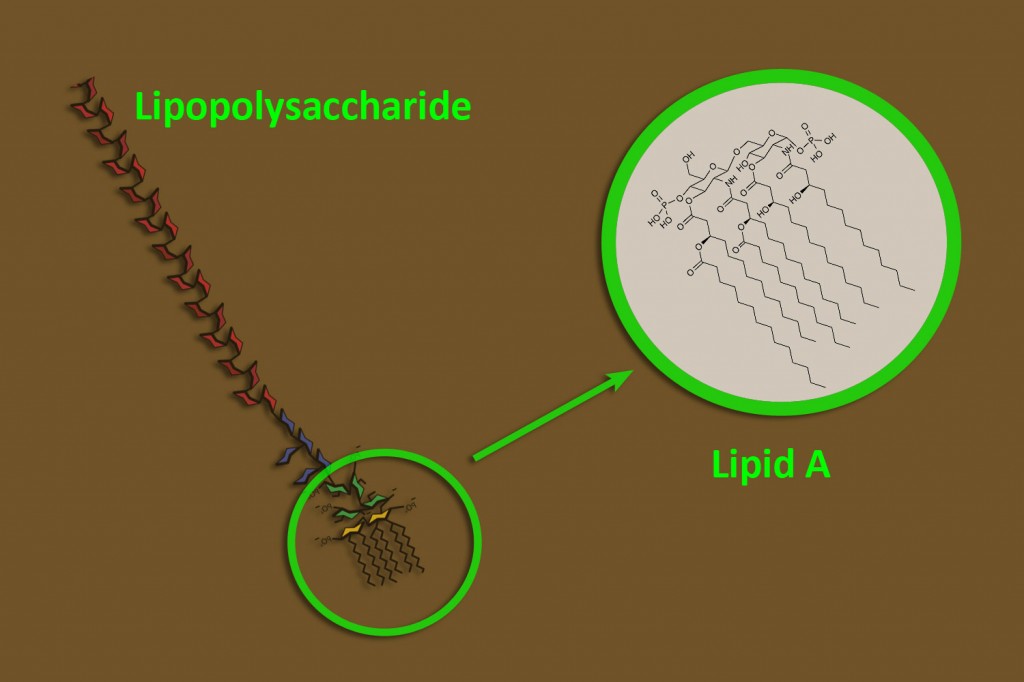
Once LPS are spread throughout the circulatory system of the sow, lipid A interferes with the metabolism of the animal:
- Suppresses the release of prolactin (hormone that initiates and maintains colostrum and milk production).
- Decreases the amount of circulating thyroid hormone (related with milk synthesis)
- Increases the concentration of progesterone (hormone that in high levels can stop milk production) and cortisol (pro-inflammatory molecule, related to the feeling of pain).
Secretion of colostrum and milk is adversely affected by these metabolic changes.
LPS also contribute to the lack of appetite of the sow.
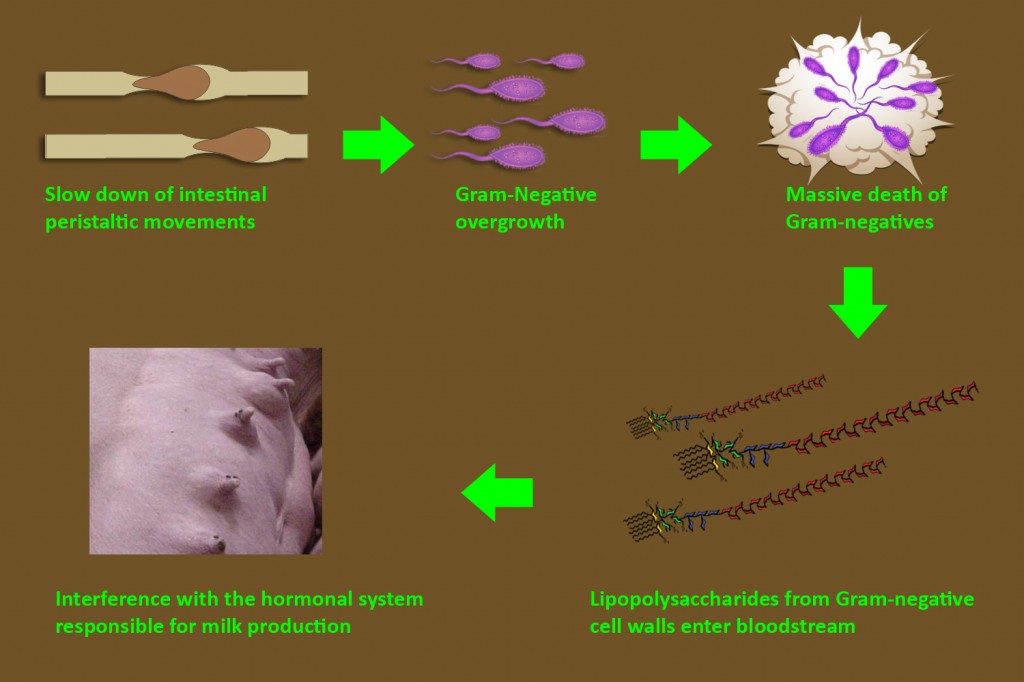
Infection of the udder by E.coli
Several weeks prior to farrowing, there is an increase of the fecal excretion of E.coli and LPS. Through the contamination of the farrowing crate or the skin of the animal, E.coli arrives to the udder, where it may proliferate and cause mastitis. LPS can pollute the teat and arrive inside the mammary gland, entering the bloodstream and causing the same hormonal interferences described above.
Stress and constipation produce an increase of the shedding of E.coli and LPS before farrowing.
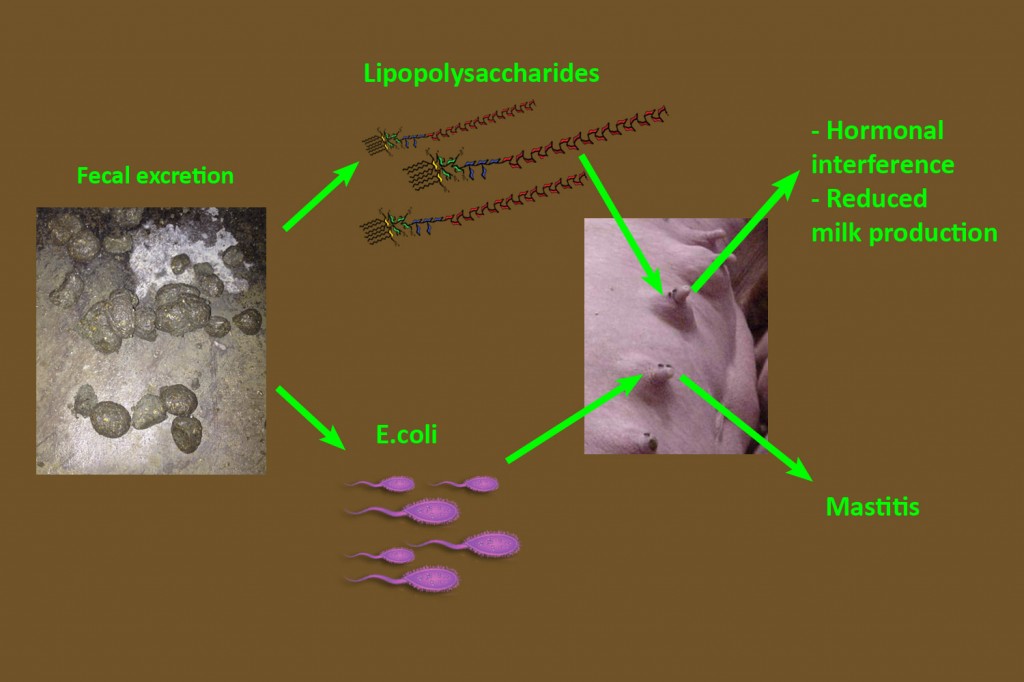
Consequences of the constipation in the farm
Constipation before and after farrowing is directly linked to postpartum dysgalactia syndrome (PDS). Postpartum dysgalactia syndrome is the insufficent secretion of colostrum and milk, especially within 12 to 48 hours post-partum, that leads to piglet starvation. The disease called “Mastitis metritis agalactia” or “MMA” is nowadays considered a subtype of PDS, and it is regarded as an old name for the problem, because in many cases there is not true agalactia, only reduced milk production, and the occurrence of metritis is very low.
PSD occurs worldwide and affects 20-30% of the sows, producing:
- In piglets younger than one week: mortality, diarrhea, crushing.
- In piglets older than one week: low weaning weight, heterogeneity of the litter.
- In the sow: worse performance in the following reproductive cycles.
- In the whole farm: decreased number of piglets/sow/year, more days needed to reach slaughter weight.
Role of phyto-active ingredients in the prevention of constipation
The best strategy for the prevention of constipation is to maintain a balanced gut flora. Phyto-active ingredients are effective through two mechanisms of action:
- Microbiocide phyto-active ingredients reduce the proliferation of pathogenic microorganisms, such as the Gram-negatives that produce postpartum dysgalactia syndrome.
- Prebiotic phyto-active ingredients, such as chicory, are able to stimulate the growth of favorable bacteria such as lactobacilli and bifidobacteria.
In the farm conditions, the administration of phyto-active ingredients to pregnant and lactating sows reduces drastically the cases of constipation and postpartum dysgalactia syndrome, cuts down piglet’s mortality by 46% and the occurrence of piglet diarrhea by half.
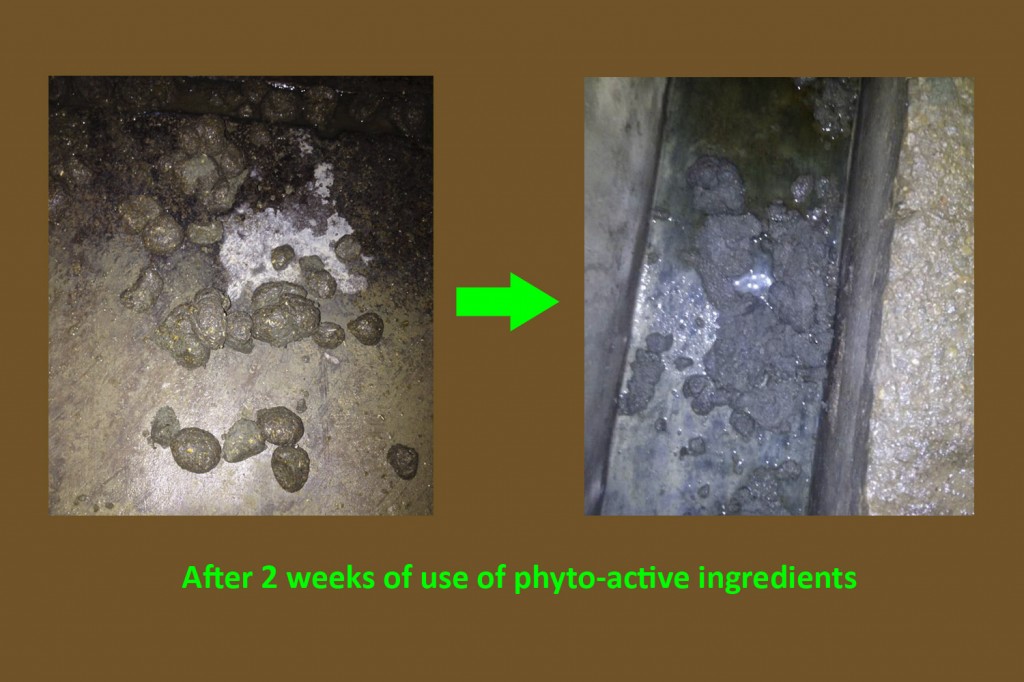
Other tips
- Many times bulky ingredients (e.g., wheat bran, beet pulp, alfalfa meal) need to be added to sow’s feed, at high levels.
- Use a good mycotoxin binder, such as the PlusBind© line. Mycotoxins debilitate the intestinal barrier and thus make it easier for LPS to enter the bloodstream.
- Provide sows enough supply of clean water.
- If sow is affected by constipation, let her walk around the farrowing room for 10 to 20 minutes a day.
- Ensure the sow hastime enough to get used to the farrowing crate, to avoid stress.
- Ensure the temperature of the farrowing house is cool.
Product of choice
ReproPlus© is a premix powder intended to maintain and improve digestive health in pregnant and lactating sows. It is formulated with synergistic ingredients:
- Bactericidal and fungicidal phytogenics, combined with organic acids.
- Phytogenics with immune boosting and antioxidant activity.
- Plant extracts with prebiotic effect.
- Vegetable oils rich in omega 3.
- Silicates with mycotoxin binding function.
When administered during the last period of gestation, it has a positive impact on the survivability and the health of the litter.
Do not miss any of our articles!
Subscribe to our monthly newsletter

Certain health statements may not be applicable in your region.

